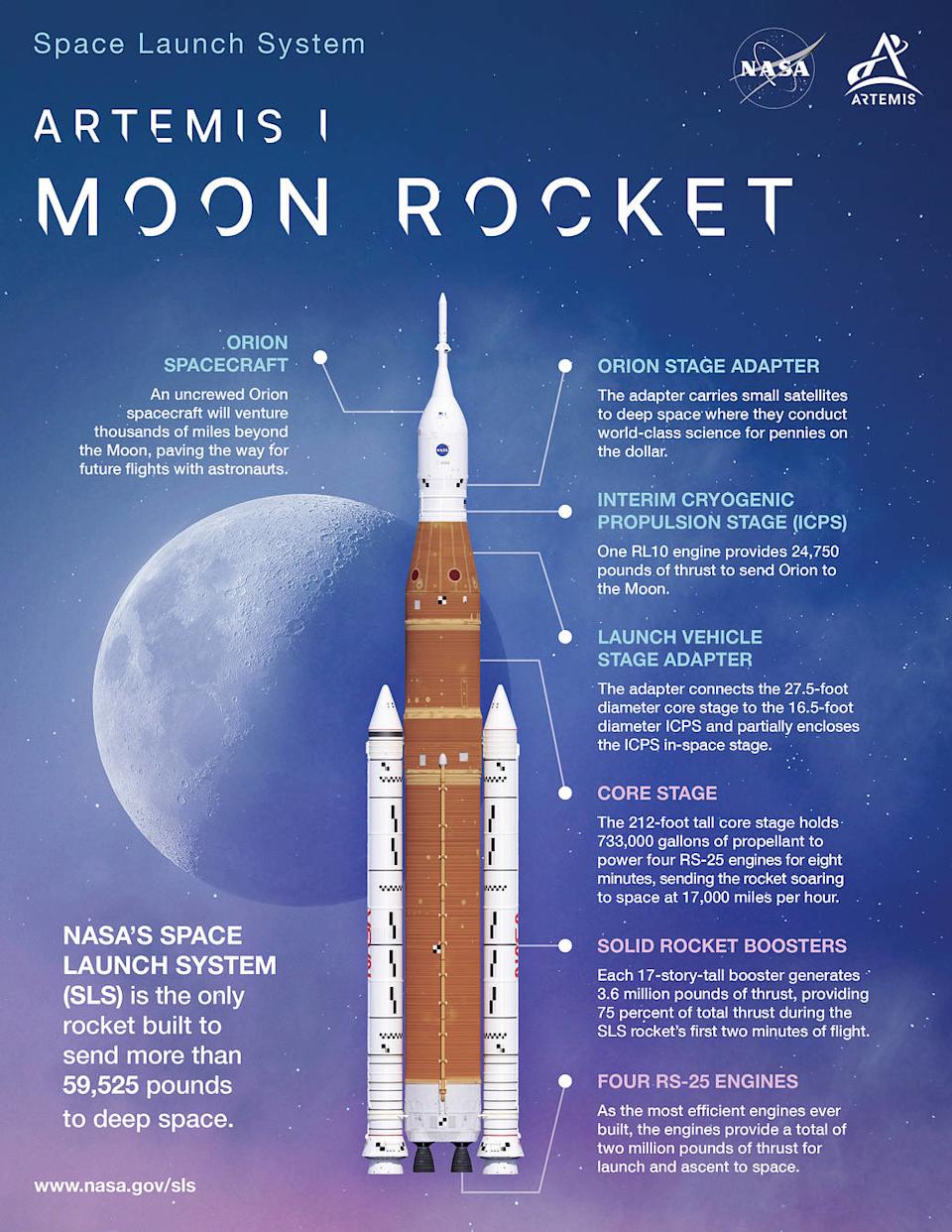NASA pushing ahead toward Saturday for SLS rocket's Artemis I launch
Space is important to us and that’s why we're working to bring you top coverage of the industry and Florida launches. Journalism like this takes time and resources. Please support it with a subscription here.
---
NASA officials are still targeting Labor Day weekend for a second attempt at launching the Space Launch System rocket on its debut flight to the moon known as Artemis I.
If everything goes according to plan during the nearly two-day countdown, teams at Kennedy Space Center will target 2:17 p.m. EDT Saturday, Sept. 3., for liftoff of the 322-foot SLS rocket and Orion capsule. It marks the opening of a two-hour window at pad 39B.
NASA officials Thursday evening confirmed technical challenges that scrubbed a first attempt three days prior were investigated, fixed, and re-checked.
"We reviewed our risk acceptance rationale and our overall risk posture, and we're setting up for a launch attempt on Saturday," said Mike Sarafin, NASA's Artemis I mission manager. "We're comfortable with our flight rationale."
"That said, there’s no guarantee we’re going to get off on Saturday, but we’re going to try," Sarafin said.
Second try: Reviewing what happened during Artemis I's first launch attempt
NASA's huge Artemis launch: It's going to be loud, but how loud? That depends
Where to watch: NASA Artemis launch: 8 truly spectacular places to watch mega moon rocket liftoff on Space Coast
The first attempt to launch Artemis I on Monday was scrubbed after several hardware issues cropped up and forced teams to go "off-script," Sarafin said. Chief among them was a sensor reading that showed one of four RS-25 main engines failed to reach the needed pre-launch temperature of minus 420 degrees.
Engine chills are made possible by "bleeding" liquid hydrogen out of the rocket's core stage and into the engine before launch. Pre-chilling helps avoid damage from thermal shock when ultra-chilled propellants are rapidly pumped in at liftoff.
After investigating the issue, officials said the temperature discrepancy came down to bad sensor readings. Engineers confirmed cold hydrogen flowed correctly into the engine, so they will ignore readings from that sensor moving forward.
"We know we had a bad sensor," NASA's SLS Program Manager John Honeycutt said Thursday. "That was our challenge early in the week where we could not see the physics of the system line up with what we were seeing from that one sensor."
Honeycutt said engineers compared "many sources of data and did some independent analysis that confirmed it's a bad sensor and we're getting good quality propellant to the engines."
Overall, there are 489 "launch commit criteria," any one of which could lead to a scrub. Sarafin said the original loss-of-mission odds – 1 in 125 – will not be noticeably impacted by the decision to move forward without the engine sensor.
Weather for Saturday's attempt, meanwhile, has improved through the week. Space Force forecasters are now expecting 60% "go" conditions during the two-hour window with the potential for cumulus clouds and rocket-triggered lightning noted as the main concerns.
"I don’t expect weather to be a show-stopper for either window (Saturday or the backup on Monday)," said Melody Lovin, a launch weather officer at the Space Force's Space Launch Delta 45. She did add, however, that there could be some periods during the countdown when weather is "no-go."
A liftoff Saturday will slightly alter the Orion capsule's uncrewed mission to the moon and back. Instead of the previously planned 42-day flight, it will become a 37-day mission with splashdown in the Pacific Ocean on Oct. 11.
Artemis I is NASA's first flight under the program designed to take the agency back to the moon. If all goes well with this flight, Artemis II will do roughly the same but with astronauts no earlier than 2024. NASA then hopes to put two astronauts on the lunar surface – Artemis III – before 2030.
If teams have to scrub again Saturday, a backup opportunity is available at 5:12 p.m. EDT on Monday, Sept. 5. Beyond that, Sarafin said, the 6th is in play but has a short window while further attempts will need to wait until at least Sept. 19.
Artemis I isn't the only launch on tap for this weekend. SpaceX is also targeting 8:32 p.m. EDT Sunday, Sept. 4, for the company's next launch of Starlink satellites on a Falcon 9 rocket. Cape Canaveral Space Force Station's Launch Complex 40 will host.
Weather for that launch is 80% "go" and the window will remain open until around 11 p.m. EDT.
For the latest, visit floridatoday.com/launchschedule.
Contact Emre Kelly at aekelly@floridatoday.com or 321-242-3715. Follow him on Twitter, Facebook and Instagram at @EmreKelly.
Launch Saturday, Sept. 3
Rocket: NASA's Space Launch System
Mission: Artemis I
Launch Time: 2:17 p.m. EDT
Launch Window: Two hours
Launch Pad: 39B at Kennedy Space Center
Trajectory: Northeast
Duration: 42 days
Backup Launch Window: Sept. 5 at 5:12 p.m. EDT
Visit floridatoday.com/space at 8 a.m Saturday, Sept. 3, for real-time updates and live video.

This article originally appeared on Florida Today: Artemis I launch: NASA still targeting September 3 for rocket blastoff

 Yahoo Autos
Yahoo Autos 